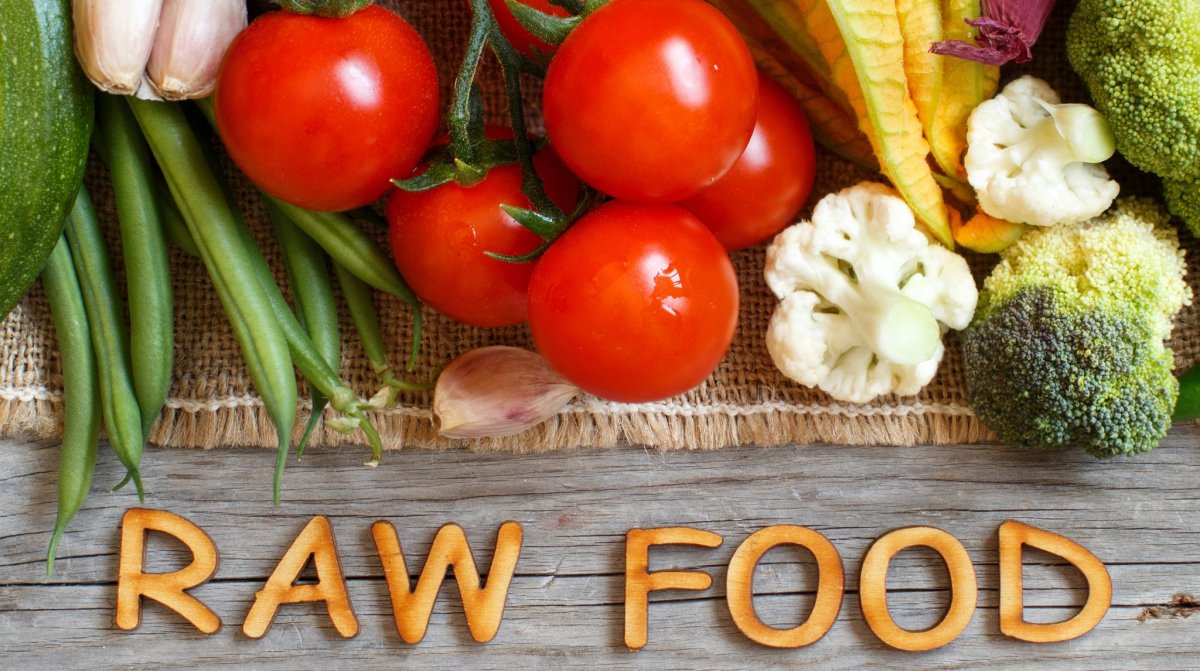
by Matt Weik, BS, CSCS, CPT, CSN
While most diets emphasize food choices rather than preparation methods, the raw food diet stands out as a trendy, plant-based eating regimen closely aligned with veganism.
The diet focuses exclusively on consuming mostly or entirely raw and unprocessed foods. Sounds pretty much like something you should be doing anyway, right?
But is the raw food diet truly beneficial for health, or does it come with some cons?
On one hand, the raw food diet encourages a high intake of plant-based foods and eliminates processed ingredients. However, those who follow the diet may find themselves restricted from consuming many traditional dietary staples they are used to consuming (and that are actually good for them).
If you’re contemplating adopting this plant-based, uncooked lifestyle, it’s essential to fully understand its implications before you dive in headfirst.
In this article, we will dive deeper into the benefits of the raw food diet and what can be some of the risks associated with it to get a better understanding of whether or not this is a diet you should try.
Disclaimer: This article is for informational purposes only and is not meant to treat or diagnose any condition. It is recommended that you speak with your doctor before starting any exercise program, making changes to your nutrition plan, or adding any new supplements into your current regimen.
What is the Raw Food Diet?
A raw food diet consists of consuming foods that have not undergone any form of cooking. Foods in this diet typically exclude anything processed, genetically modified, or foods that are not organic.
According to the 2022 U.S. News and World Report Best Diets rankings, the raw food diet is placed at number 32 in the category of Best Diets Overall, receiving an overall score of 2.3 out of 5.
What Can You Eat on the Raw Food Diet?
Below are some of the breakdowns of foods that are good for the raw food diet, as well as what is considered “off limits” with the diet.
Foods suitable for most raw food diets:
- Raw fruits and raw vegetables
- Freshly made fruit and vegetable juices
- Dried fruits and vegetables
- Soaked and sprouted beans, legumes, and grains
- Raw nuts and seeds
- Raw nut butter, including peanut and almond butter
- Nut milk, including almond and coconut milk
- Cold-pressed olive oil or coconut oil
- Nutritional yeast
- Seaweeds
- Dried fruits
- Green food powder, such as dried wheatgrass or algae
- Fermented foods, including kimchi and sauerkraut
- Purified water, but not tap water
- Other organic, natural, or unprocessed foods
Additional foods depending on the type of raw food diet:
- Raw eggs
- Raw fish, including sushi or sashimi
- Other raw or dried meats
- Non-pasteurized and non-homogenized milk and dairy products
Foods to avoid:
- All cooked or processed foods
- Refined oils
- Table salt
- Refined sugars and flour
- Coffee, tea, and alcohol
- Pasta
Benefits of the Raw Food Diet
Many people who follow the raw food diet believe that it enhances the body’s ability to prevent and combat diseases, particularly chronic conditions. We clearly can’t make any claims, but the research on the raw food diet is quite interesting.
According to a 2019 review, adopting a plant-based diet (not necessarily raw) offers substantial benefits for physical health and disease prevention.
Below are some of the benefits of implementing the raw food diet:
1. Source of fiber and antioxidant
While many adults in the US find it challenging to meet their daily fiber requirements, followers of a raw food diet typically consume ample amounts of fiber.
Similarly, antioxidants sourced from fruits, vegetables, nuts, seeds, whole grains, and legumes are often lacking in the standard American diet.
The raw food diet, centered on fruits, vegetables, nuts, and seeds, naturally provides high levels of both fiber and antioxidants.
2. Good for bone and teeth
The raw food diet is characterized by a higher proportion of alkaline foods and fewer acidic foods, which are believed to be more compatible with the body’s pH balance. This dietary approach is thought to support overall bone and teeth health.
Raw foods are rich in vitamin C, which contributes to improved gum health and helps prevent cavities.
3. Low in added sugar
A raw food diet tends to be high in natural sugars from fruits but generally low in added sugars commonly found in processed foods.
Research confirms a strong link between consumption of added sugars and increased risk of chronic diseases. Individuals adhering to a raw food diet may, therefore, benefit from a reduced risk of conditions associated with high intake of added sugars, including obesity, heart disease, diabetes, and non-alcoholic fatty liver disease.
4. It may help in weight loss
The raw food diet, which contains low-calorie foods and a limited selection of permissible items, can be viewed as a low-calorie regimen that potentially helps in weight loss. However, this does not necessarily designate it as the best choice for weight management.
Instead, integrating elements of a raw food diet, such as increasing consumption of raw fruits and vegetables, can contribute to a more balanced and sustainable approach to maintaining a healthy weight and promoting overall well-being.
Risks of the Raw Food Diet
A raw food diet is generally discouraged due to several health risks and drawbacks.
- It often lacks balance as it predominantly consists of low-calorie fruits and vegetables, making it challenging to meet nutritional needs.
- Removing food groups like dairy and proteins can further limit essential nutrient intake.
- Additionally, the diet can be expensive, especially if organic foods are preferred.
- Followers may struggle with low levels of vital vitamins and minerals, necessitating supplementation.
- Moreover, the diet’s restriction on cooking increases the risk of foodborne illnesses associated with raw foods and sprouted items.
It’s completely up to you if you want to try the raw food diet. You need to weigh the pros and cons to determine if it’s worth implementing into your lifestyle.


